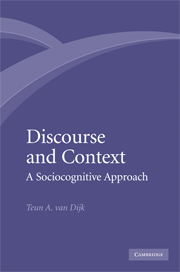4 - Context and discourse
Published online by Cambridge University Press: 22 September 2009
Summary
My claim is that context permeates language, that contextual assumptions affect how we understand language, and that contexts of speech have to be better understood to develop realistic theories of language and of language learning.
(Susan Ervin-Tripp, 1996: 21)Introduction
This chapter focuses on the main function of contexts, namely how they enable and constrain the production and comprehension of text and talk. I shall start with a conceptual analysis of the possible relationships between context and discourse. These may be described in many terms, such as "influence," "control," "mapping," "manifestation," "expression" and "indexing", among others. Then, I shall examine some of the crucial notions that are often used to describe the product of this contextual influence on discourse, such as style, register, genre, variation and related notions. Finally, I shall review some major dimensions of discourse that are thus systematically controlled by context structures, and conversely, how such discourse dimensions may in turn influence the context models of participants, that is, their interpretation of the ongoing communicative event.
Since much of this discussion presupposes vast fields of earlier research, especially in sociolinguistics, I shall focus particularly on the contextual control of discourse structures, assuming that the influence of context on grammar, that is, on phonology, prosody, syntax and the lexicon, is well known.
Information
- Type
- Chapter
- Information
- Discourse and ContextA Sociocognitive Approach, pp. 111 - 216Publisher: Cambridge University PressPrint publication year: 2008
Accessibility standard: Unknown
Why this information is here
This section outlines the accessibility features of this content - including support for screen readers, full keyboard navigation and high-contrast display options. This may not be relevant for you.Accessibility Information
- 1
- Cited by
